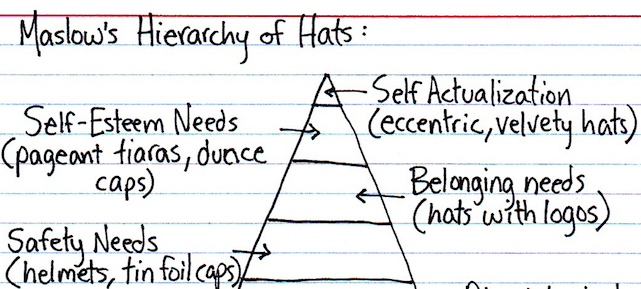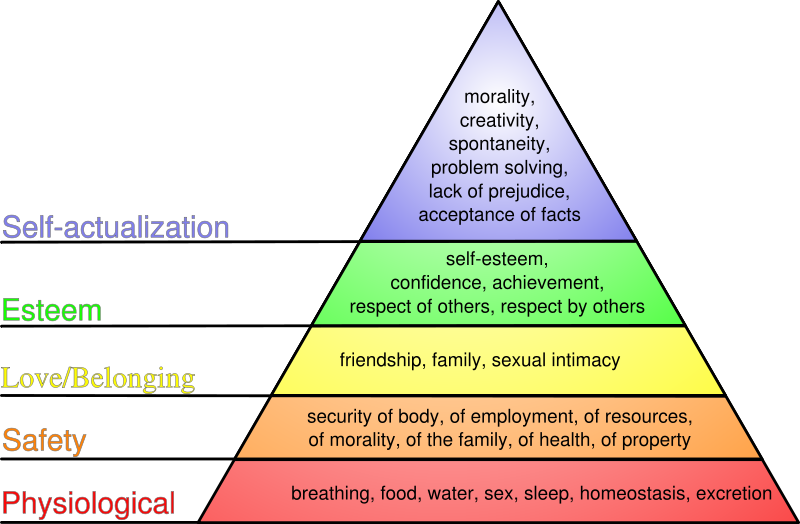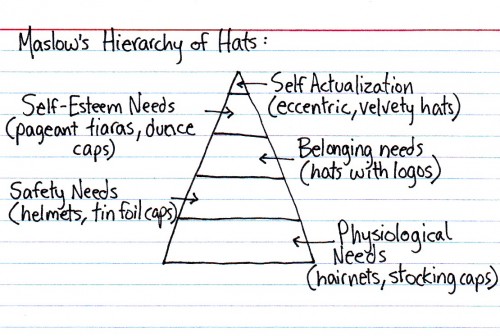
 As you may recall from Psych 101, Abraham Maslow’s “Hierarchy of Needs” is one particularly popular way to explain human motivation, “a neat and tidy pyramid, with fulfillment of ‘physiological needs’ at its base, then things like ‘safety,’ ‘love,’ ‘belonging’ and ‘esteem’ stacked on top, all capped by ‘self-actualization.'”According to a recent article by Lisa Belkin in The NY Times Magazine, a new study is making the bold claim that “parenting” should replace self-actualization at the top of the pyramid. Interesting and provocative as that proposed change may be (esp as a recent parent), I was struck more by the response/reaction to it, by what it revealed so clearly: the way we almost automatically turn such schemas into aspirational ladders to climb, description into prescription, observations into “oughts.” The human tendency to fashion measuring sticks out of whatever we find in front of us is more than just uncanny, it’s almost perverse. Convicting to say the least. But there I go again…! Without any further ado, the human hardwiring for Law laid painfully bare (Romans 2:14):
As you may recall from Psych 101, Abraham Maslow’s “Hierarchy of Needs” is one particularly popular way to explain human motivation, “a neat and tidy pyramid, with fulfillment of ‘physiological needs’ at its base, then things like ‘safety,’ ‘love,’ ‘belonging’ and ‘esteem’ stacked on top, all capped by ‘self-actualization.'”According to a recent article by Lisa Belkin in The NY Times Magazine, a new study is making the bold claim that “parenting” should replace self-actualization at the top of the pyramid. Interesting and provocative as that proposed change may be (esp as a recent parent), I was struck more by the response/reaction to it, by what it revealed so clearly: the way we almost automatically turn such schemas into aspirational ladders to climb, description into prescription, observations into “oughts.” The human tendency to fashion measuring sticks out of whatever we find in front of us is more than just uncanny, it’s almost perverse. Convicting to say the least. But there I go again…! Without any further ado, the human hardwiring for Law laid painfully bare (Romans 2:14):
A group of academic psychologists have redesigned the nearly 70-year-old triangle. Most notably they have knocked “self-actualization” off the pinnacle and replaced it with “parenting.” Right below, they have added “mate retention” and “mate acquisition.”
This very academic change — which was an attempt on the part of its proponents to look at human motivation based on evolution — has sparked some very visceral responses. It has brought protest from people who don’t want children (and who see the redesign as a criticism of their choice) or can’t have children (who see it as an intimation that they are not psychologically complete) or who oppose gay marriage (who see in this an attempt to legitimize same-sex parenting as a psychological right). Most of all, it raises the question of whether the tendency in recent decades to all but sanctify parenting has gone just a bit too far.
When Abraham Maslow published his paper “A Theory of Human Motivation” in 1943, it was a rebuttal of the prevailing theory that everything humans do stems from physical needs. A baby learns to love by bonding with its food source, the older behaviorist thinking went. Maslow’s newer argument was that humans are not motivated simply by hunger and thirst but by higher goals. “A musician must make music, an artist must paint, a poet must write if he is to be ultimately at peace with himself,” he said.
Over the decades, though, Maslow’s triangle came to be seen as “aspirational” — a description of what fulfilled individuals “should” do — rather than as an explanation of how human motivation actually works.
[Arizona psychology professor and study director Douglas] Kenrick and his colleagues are careful to say that, unlike Maslow, their pyramid is not aspirational, and that by placing parenting at the top they are not promoting it as the “right” or “laudable” path. They are simply explaining, with illustrations, why we, as a species, act as we do.
Point taken. But I find it hard to look at the new pyramid, with parenting at its apex, and not see a value judgement. That’s because in the decades since Maslow proposed his hierarchy, in the decades, even, since Kenrick became a father, “parent” became a loaded verb. Once, “parent” was something you were, not something you did. We have elevated it into a profession, a competition, a calling.
- via http://thisisindexed.com/2010/11/where-your-head-is/

COMMENTS
One response to “Maslow’s Hierarchy of Needs, Parenting and The Law”
Leave a Reply














This elevation of parenthood (and antecedent mate acquisition) as a profession, competition, and calling is perhaps most obviously manifest in the Neo-Reformed camp. Appropos of nothing now I am reminded of N. T. Wright on Colbert talking about kids and grandkids. When Wright mentioned grandkids Colbert said, "It's not a race." To which Wright joked, "Oh, really? I thought it was."